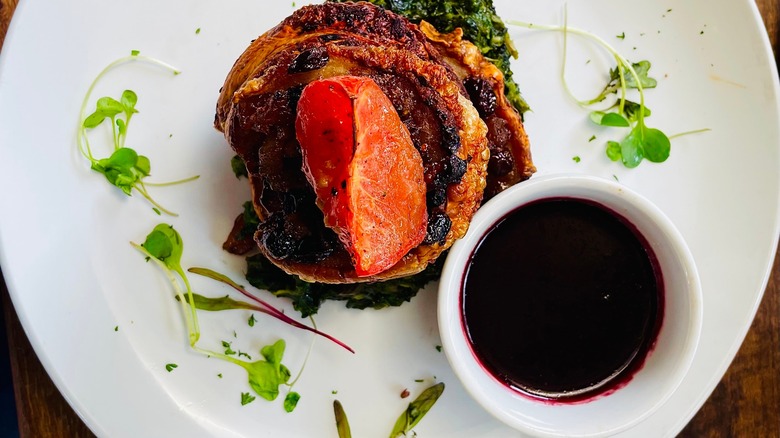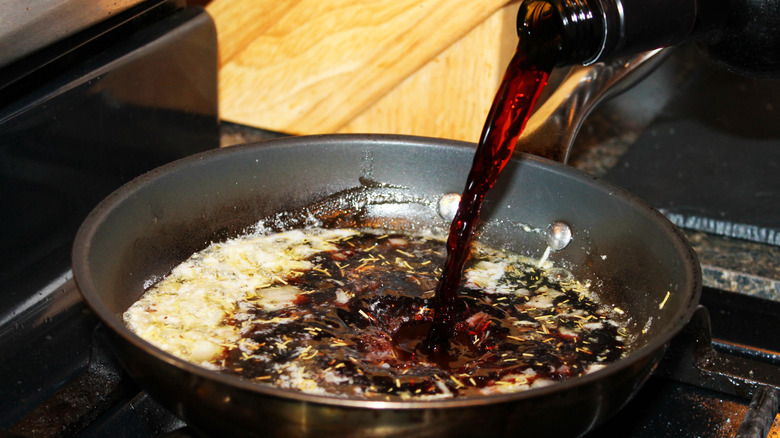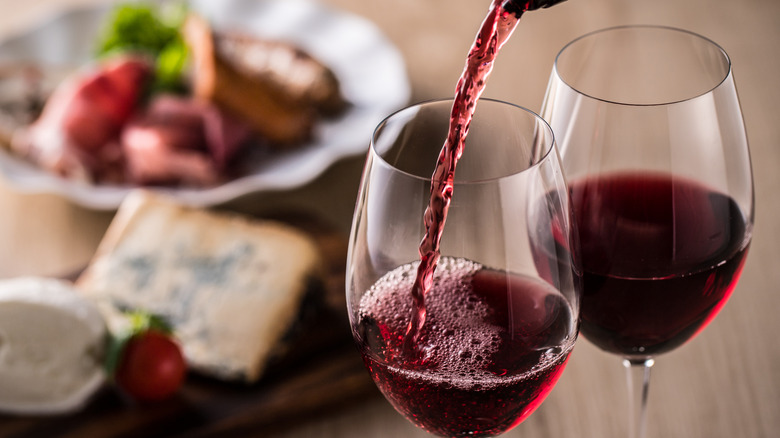The Best And Worst Wines To Use For A Reduction Sauce
You've more than likely tasted a reduction sauce before, whether you realized it or not. Maybe you've seen it drizzled over a sliced steak, accompanying a duo of braised short ribs, or pooled underneath a piece of gamey meat, such as lamb or venison.
A reduction sauce is made by cooking liquid down, effectively reducing its volume, to create a thick sauce with intensified flavor. In the case of a wine reduction sauce, you'd typically reduce a mixture of aromatics, wine, and broth or stock — or even just the wine itself — until it's almost syrupy in consistency. The process makes for a flavorful, concentrated sauce that pairs wonderfully with proteins and complements the richness of your meal.
Whether you're a reduction pro or you're ready to tackle a wine reduction sauce for the first time at home, there's an important decision to make: which type of wine to use. In the world of reduction sauces, not all wines are created equal; some are much better prepared for the job than others.
The best wines to use for a reduction sauce
There are two rules of thumb when it comes to choosing wine for a reduction sauce: first, think dry, dry, dry. Second, if you don't enjoy sipping the wine by itself, don't use it in your sauce. You may think the wine itself doesn't matter much if you're cooking it down anyway. But remember that the wine is the star of the show here, and its flavor notes will be concentrated to shine through the sauce.
If you're making a red wine reduction sauce, some of the best choices are Merlot, Cabernet Sauvignon, Pinot Noir, Chianti, or Barbera. All of these wines are dry and full-bodied, which will reduce well and make for a balanced sauce. They also tend to have earthy or woody notes, yet still offer a subtle fruity flavor or jamminess that pairs well with most proteins. Choose a Cabernet that's not too oaky and a Pinot Noir that's more acidic than sweet.
White wine can be used in reduction sauces, too. You'll want to stick to the same general rules here, choosing something dry (that you know you like) and on the acidic side. Great choices for a white wine reduction are Sauvignon Blanc, Pinot Grigio, (unoaked) Chardonnay, or Albariño — all dry, crisp, versatile wines with high acidity and balanced flavors.
The worst wines to use for a reduction sauce
There are endless amounts of wine varietals out there. If you're experimenting with different types of wine in your sauce, it's also helpful to know what to stay away from.
The bottom line is that the sweeter the wine, the more you want to avoid it for a reduction sauce. The sugar only becomes more concentrated as you reduce the wine, so a wine with higher sugar content will almost caramelize in some cases, becoming too sweet and dessert-like to complement your dish well.
That said, the worst types of reds to go for are Zinfandel, Granche, and Shiraz — all too sweet and berry-forward to achieve a truly balanced sauce. When it comes to whites, stay away from particularly aromatic or overly sweet wines, including Viognier, Gewürztraminer, oaky Chardonnay, and Riesling. In both cases, steer clear of inexpensive boxed wine or jugs, as these often come with more residual sugar.



